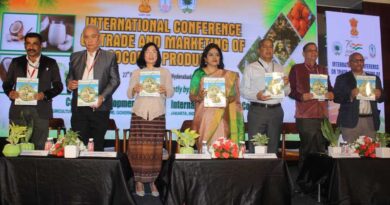
At COP30 Crossroads, TERI Calls for Re-anchoring Climate Equity through Human Development and Energy Justice
08 November 2025, New Delhi: As the international community prepares for the 30th Conference of the Parties (COP30) to the UNFCCC in Belém, Brazil, a new paper by The Energy and Resources Institute (TERI) urges countries to restore equity and human development to the heart of global climate cooperation.
The paper, titled Re-anchoring CBDR-RC in Human Development and SDGs for Climate Justice, redefines the global climate discourse by linking human development and energy consumption to operationalize equity and justice. Authored by Dr Shailly Kedia, Senior Fellow, TERI, with contributions from Pujeet Jha, Researcher, TERI School of Advanced Studies, and reviewed by Mr RR Rashmi, Distinguished Fellow, TERI, and former Principal Negotiator for Climate Change at the UNFCCC, the study offers a measurable approach to the principle of Common but Differentiated Responsibilities and Respective Capabilities (CBDR-RC)—a cornerstone of the UNFCCC.
The paper notes that 10 years after the adoption of the Paris Agreement and the Agenda 2030 for Sustainable Development and its 17 Sustainable Development Goals (SDGs), the balance between climate ambition and development remains uneven. Global focus has tilted toward emissions metrics, while the developmental foundations of climate justice–equity, capability, and human well-being–have receded to the background. The study establishes a strong empirical linkage between human development and energy access, showing that energy poverty is human poverty. Without reliable and affordable power, no country can provide healthcare, education, or livelihoods.
Using the 2000-Watt Society as a benchmark, the paper sets a sustainable and equitable energy use goal of 2000 watts (48 kWh per day) per person—aligning efficiency and sufficiency with quality of life. It argues that this benchmark can anchor SDG 7 (Affordable and Clean Energy) while linking energy sufficiency to dignity and development.
India’s per capita energy consumption currently stands at 866 watts—less than half the sustainable benchmark—while high-income economies average more than 6,000 watts. The paper highlights that achieving climate justice demands addressing both underconsumption in developing countries and overconsumption in high-income countries. To operationalize CBDR-RC, the study maps 187 countries based on their per capita energy consumption and Human Development Index (HDI) levels, classifying them into eight zones—each representing a different stage in the balance between development and sustainability.
The framework transforms equity from a static principle into a dynamic, measurable tool, enabling countries to pursue differentiated yet complementary trajectories:
- Zone 1 (68 countries): Very high HDI and excessive energy consumption, including the United States, Canada, Japan, and many EU countries. These countries must lead deep decarbonization and support developing countries through means of implementation especially finance and technology.
- Zone 2 (15 countries): Emerging economies such as China, Brazil, South Africa, and Indonesia, which must balance human development with decoupling growth from emissions.
- Zone 3 (2 countries): Medium-HDI countries nearing balance between energy use and human development.
- Zone 4 (no country): No low-HDI country has high energy consumption, underscoring the absence of overconsumption among the poor.
- Zone 5 (26 countries): Low human development and extremely low per capita energy consumption, mainly in Sub-Saharan Africa and South Asia. These countries face severe energy poverty and high vulnerability.
- Zone 6 (40 countries): Lower-middle-income countries such as India, Bangladesh, and Nigeria. These countries must expand energy access for development while staying within sustainable limits.
- Zone 7 (33 countries): High-HDI countries with moderate energy use that remain vulnerable and should strive for resilience.
- Zone 8 (3 countries): Albania, Costa Rica, and North Macedonia, which have achieved very high HDI with relatively low energy consumption.
This HDI–Energy Zoning Framework provides a scientific and ethical foundation for a Zone of Climate Justice, where sustainable energy use and high human development coexist.
The study traces the evolution of CBDR-RC from static differentiation under the UNFCCC to self-differentiation under the Paris Agreement. However, it warns that this evolution has diluted the operational meaning of equity.
By integrating data on energy and HDI, the paper redefines CBDR-RC as a living principle—capable of evolving with changing capacities and responsibilities.
As the world approaches COP30, TERI calls for re-anchoring climate cooperation in equity, responsibility, and shared prosperity. Incremental pledges alone will not achieve just transitions; the coming decade must bridge climate ambition and human development.
Dr Vibha Dhawan, Director General, TERI, said: “COP30 needs to recognize that equity and just transitions cannot be achieved through incremental pledges. It demands a re-anchoring of global cooperation in the principles of equity, responsibility, and shared prosperity through human development and equitable clean energy access.”
Mr RR Rashmi, Distinguished Fellow, TERI, and former Principal Negotiator for Climate Change at the UNFCCC observed: “This paper is an attempt to define the principle of equity and CBDR and differentiate nations based on their share in per capita energy consumption which is closely linked to SDGs. It gives an ethical basis of actions under the Paris Agreement.”
Dr Shailly Kedia, Senior Fellow, TERI, added: “Energy poverty is human poverty. Access to reliable and affordable power is fundamental to healthcare, education, and livelihoods. This paper calls for re-anchoring climate justice through Common but Differentiated Responsibilities and Respective Capabilities (CBDR-RC), anchored in human development and equitable energy use within a Zone of Climate Justice.”
As the paper concludes, “A climate regime divorced from development cannot deliver justice, and development pathways divorced from planetary limits cannot deliver sustainability.”
The paper is part of TERI’s Act4Earth initiative under the SDG Charter, which aims to bridge gaps between climate ambition and sustainable development through evidence-based policy frameworks and global dialogue.
Also Read: UPL Limited Reports Strong Q2 Performance, Advanta and UPL Corp Drive Growth
📢 If You’re in Agriculture, Make Sure the Right People Hear Your Story.
From product launches to strategic announcements, Global Agriculture offers unmatched visibility across international agri-business markets. Connect with us at pr@global-agriculture.com to explore editorial and advertising opportunities that reach the right audience, worldwide.






